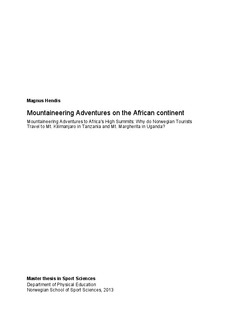Mountaineering adventures on the African continent : Mountaineering adventures to Africa's high summits : why do Norwegian tourists travel to Mt. Kilimanjaro in Tanazania and the Mt. Margherita in Uganda?
Abstract
This master thesis is a qualitative study of Norwegian people, and why they wanted to
travel to Tanzania or Uganda, to climb Mt. Kilimanjaro or Mt. Margherita. My main
research question has been: “Why do Norwegian people want to climb Mt. Margherita
in Uganda and Mt. Kilimanjaro in Tanzania?” The following questions have supported
my main research question: “How are they reflecting upon the trip they have been
participating on, and how can these journeys contribute to formation of self?” Research
on the field has previously been undertaken in adventure education, leisure science and
recreation fields. There has been limited research on adventure tourism, and
mountaineering has been studied in the form of adventure recreation.
I was guiding two trips in 2011/12, which I used in my project. Qualitative interviews
were conducted with seven of the participants. All of my participants live in, or in
proximity of Oslo. They have good jobs and older- to grown up kids, if they have any.
The age is spread from 31 to 63 years old, and there are four women and three men in
the group.
Several motives for participation were identified. They wanted a challenge, an exotic
experience, a new adventure, and climb a summit, all within a safe setting. The
participant’s reflections indicate that they are taking part of and adventure, even tough
some literature question this. In this context they are part of mountaineering adventure
tourism, and they had the opportunity to bypass the once normal way to reach a summit.
This also opens up for emotional feelings that normally are connected to “hard”, or
“real” mountaineers. Another motive for travelling to Tanzania and Uganda among my
participant’s is the interest for people and culture, and a contribution to social
equalization. It’s a big business around tourism, but it doesn’t necessarily contribute to
intercultural knowledge, or social equalization.
My participant’s had some, according to themselves, great experiences. Some
experiences are felt on the body, for example the physical challenge of reaching the
summit. This was a new experience to 6 of 7 participants. How the experiences
contribute to formation of self depends on their previous background, how they will
interpret their experiences, and how these can be developed in the future.
Description
Masteroppgave - Norges idrettshøgskole, 2013
